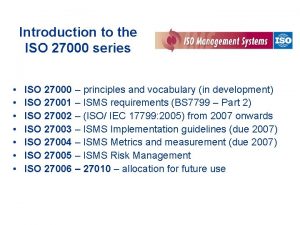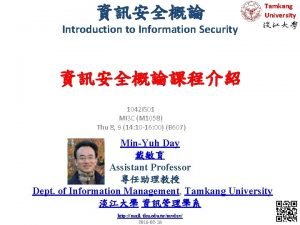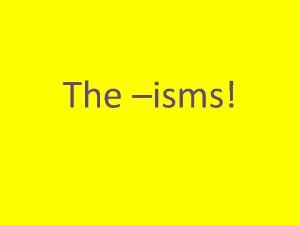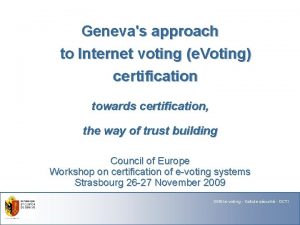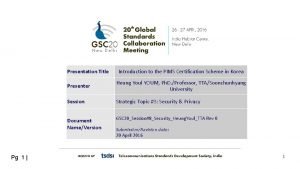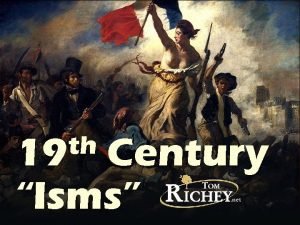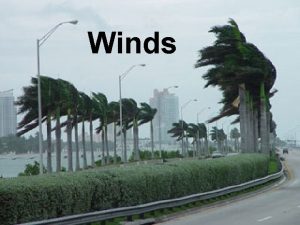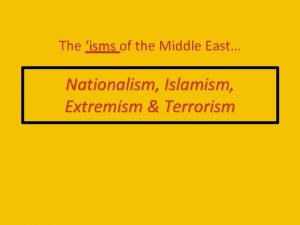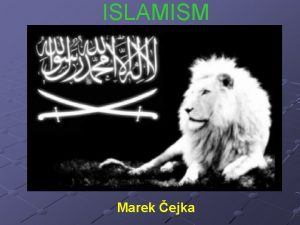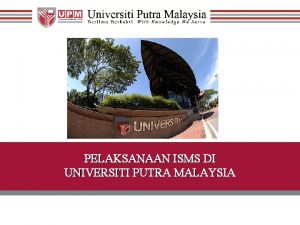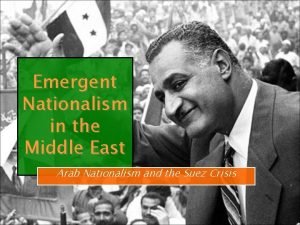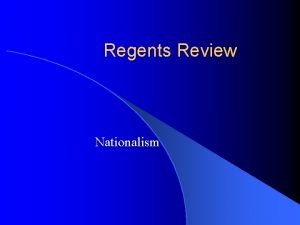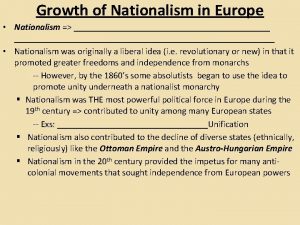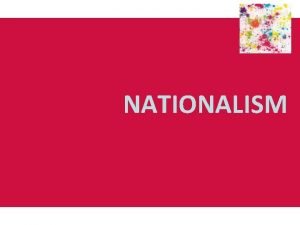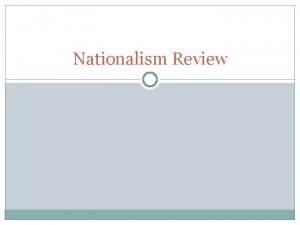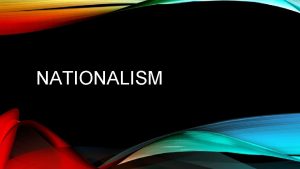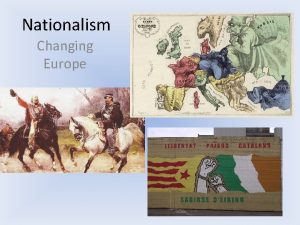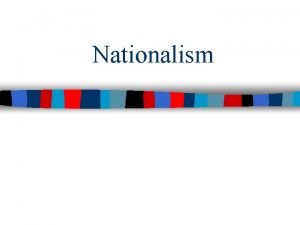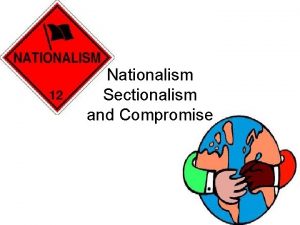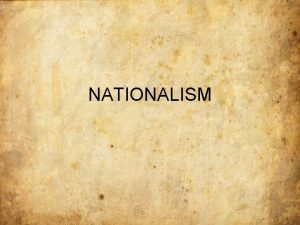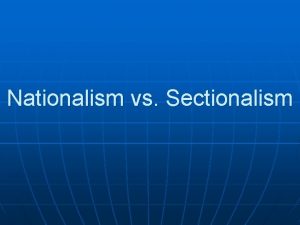The isms of the Middle East Nationalism Islamism


















- Slides: 18

The ‘isms of the Middle East… Nationalism, Islamism, Extremism & Terrorism

VII. Military rule, Arab Nationalism, and Oil Power (1948 -1973) T Na h is tio is A na ra lis b m ! h p& ttps q : / 89 =de /ww 45 fi n w. 1 iti. g 8. on oo 14 + g. 0 of+ le. c. 4. 4 nat om. 0 io /s. 1 n e 24 al ar. 9 ism ch 75 & ? b. 1 oq iw 3 j 1. =de =1 0 14 f 24. 0 ini &. m tio bi RN sed n+o h=6 e. U r. . . f+ 14& 0. na n. . 1 t& o j c. 1 gs =1. 6 _l= &s 2. h it e hp p. . . 1 1. 0 =we. 1 7. 0 bh. 8 l 10. p& 77 18 s. 0 49 ou. _ r U 3. 59 ce= x 2 89. h Eh 0. A. The 1948 “Humiliation” led to problems for the Arab monarchies: 1. Numerous political assassinations during 1950’s 2. Syria, Iraq, and Egypt’s kings were all overthrown by military coups in the 1950’s B. New military dictators in Syria, Iraq, and Egypt wanted to create a “Giant Arab” State. It would include all Arabs and look something like the great Arab Empire of the 600’s 900’s. They ran into three big problems, : 1. Where would the Capital city for the new empire be located ?

2. Lack of success against Israel (b/c of Western Support) 3. Arabs outside Egypt, Syria, and Iraq didn’t want to live under the control of another Arab nations leader C. Nations in the Middle East began nationalizing their oil supplies. The Organization of Petroleum Exporting Countries was created in 1960. D. Iran nationalized its oil supplies in 1951, but we sent in the CIA for spoil their plans.

VIII. The Rise of “Islamism” (1979 -Today) A. After losing to Israel in 1973 the Arab world lost trust in Arab Nationalism. They now looked to Islam to unite and strengthen them. Religious political parties like Egypt’s Muslim Brotherhood began to gain power. B. The leaders in the Middle East were NOT very religious. As a result they tried to crush the new political movements in the following ways: 1. Violent repression of religious political groups 2. Giving a great deal of power to religious leaders/clerics -(Ayatollah in Iran)

Ø The leaders successes infuriated the religious groups who resorted to violence and terrorism as their only means of political power. D. There were several notable successes for the Islamist groups: 1. In 1979 Shi’ite Muslim militants took over Iran. Sources in Iran continue to fund arm terrorist groups in the region, including Hezbollah in Lebanon and Hamas in Palestine (West Bank). 2. During the 1980’s Sunni Muslim militants fought against and defeated the USSR in Afghanistan. This was where Osama bin Laden and Al Qaeda got their start. E. Currently this movement has spread throughout the region to all corners of the Arab world, including parts of northern Africa. Ø Places like Tunisia, Egypt, Libya, and Syria have all seen major uprisings within the past 5 years…these revolutions have been referred to as the “Arab Spring”.

IX. Islamic Fundamentalism and Terrorism A. Fundamentalism - The belief that returning to the past can solve present problems, often B. Islamic Fundamentalists believe that 1400 years ago was the best society. It was one Islamic empire from Spain to Iran following the Koran.

C. As Middle Eastern nations became more western, groups developed to protect Islamic culture. v Develops when modernization is well-established, so a reaction against it because: • deep disappointment with modernity • fear of secularism, liberalism and its values • pushing religion from the sidelines back to the center • begins as an internal dispute within own culture/country Ex. opposing westernizing leaders or policies -return to a “golden age” – overstressing traditional values Ex. putting women back into veils 1. The Naqshbandi Want to return to a pure form of Islam through education. 2. The Wahhabis A form of Islam which would purify the religion.


X. Terrorism A. Terrorism - Targeting innocent people to disrupt their way of life or frighten them to achieve a political or economic goal B. Who are terrorists? 1. Repressive Governments a. Joseph Stalin, Adolf Hitler and Saddam Hussein

2. Left wing Extremists - Freedom Fighters a. The Irish Republican Army b. The Palestinian Arabs c. Chechen rebels 3. Right wing Extremists a. Ku Klux Klan b. Timothy Mc. Veigh c. Osama bid Laden The leftist Red Youth Avant-garde (AKM) stages an anti-government rally in Moscow.

C. What makes a person resort to terrorism? 1. Hopelessness – Many people are living in poverty. 2. Population – A large population with 50% under the age of 15. 3. Government – The promise them a better life, but they never experience it. 4. Western media – Seeing the wealth of western nations on television. 5. Lack of political rights- a. Corrupt "Western Style" authoritarian leaders. b. Lack of political freedoms.

6. Raised that way 7. Education – Privately funded schools which teach radical Islamic viewpoints. a. Some attend right wing fundamentalist or extremist Madrassahs and are taught a violent form of Islam. b. Madrassahs – Religious schools

D. Who do Islamic terrorist groups target? 1. Any corrupt western style government. 2. Moderate Muslims who do not agree with them. 3. Anyone who supports the creation of Israel. 4. American culture which is corrupting their society. (Examples include Mc. Donald's, Coke, and movies. ) 5. Conflict over religion. (Christianity vs. Islam) 6. Strong western military presence in the Middle East. There are troops in Saudi Arabia, Qatar, Kuwait, the Persian Gulf, Philippines, Yemen, Afghanistan, and Turkey.

In the news… ISIS • Stands for “Islamic State of Iraq and Syria” • Broke off of Al Qaeda in Iraq • Are Sunni Muslims, wanting to take over the Shiite run government in Iraq • Began growing during the civil war and chaos in Syria • Uses acts of terror as its primary weapon For More Info…http: //abcnews. go. com/WN/fullpage/isis-trail-terror-isis-threat-us-25053190

1. Does this cartoon illustrate nationalism, Islamism, extremism or terrorism? 2. How do you know? 3. What is the message of this cartoon?

1. Does this cartoon illustrate nationalism, Islamism, extremism or terrorism? 2. How do you know? 3. What is the message of this cartoon?

1. Does this cartoon illustrate nationalism, Islamism, extremism or terrorism? 2. How do you know? 3. What is the message of this cartoon?

1. Does this cartoon illustrate nationalism, Islamism, extremism or terrorism? 2. How do you know? 3. What is the message of this cartoon?
 Nationalism in africa and the middle east
Nationalism in africa and the middle east North american
North american Iso 27000 series overview
Iso 27000 series overview Isms
Isms Iso 27001 implementation proposal
Iso 27001 implementation proposal Isms
Isms Isms 1042
Isms 1042 Isms org
Isms org Isms in literature
Isms in literature Isms
Isms Isms spectroscopy
Isms spectroscopy Isms keller
Isms keller Iso 27001 roadmap
Iso 27001 roadmap The 5 isms
The 5 isms Isms guiding principles
Isms guiding principles Hvad er iso 27001
Hvad er iso 27001 Pims isms
Pims isms Conservatism
Conservatism Winds that blow over short distances are called
Winds that blow over short distances are called


